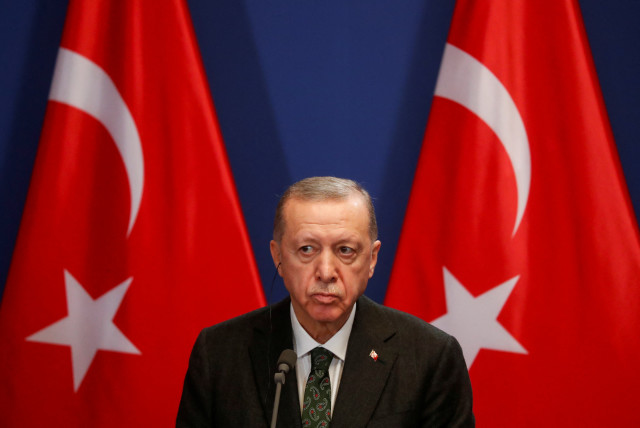For Erdogan, arrest of Israeli soccer player makes good politics before local elections

Erdogan’s entire, long reign in power has been an effort to come across as the defender and protector of the Palestinians and Jerusalem to gain stature in the Arab and Muslim world.
On August 4, 2014, then deputy foreign minister Tzachi Hanegbi had this to say about Turkey’s leader, Recep Tayyip Erdogan: Turkey’s leadership, especially Erdogan, employs the “manipulative, populist tactic of insulting the Jews” before each election.
In a country where the voters are Muslim, those with the more antisemitic “insights” get ahead, he said in a radio interview, referring to the way Erdogan – the country’s prime minister at the time – stepped up his antisemitic rhetoric just days before a presidential election that he won handily.
Turkey’s arrest on Sunday of Israeli soccer player Sagiv Yehezkel for writing an innocuous message of support for the Israeli hostages alongside a small Star of David on a wrist bandage that he showed after scoring a goal for the Antalyaspor club he plays for shows that what worked back then, in 2014, can work today.
At the end of March, Turkey will be holding municipal elections, with Erdogan keen on recapturing the cities of Ankara and Istanbul, two municipalities his AKP Party lost in the 2019 elections. Bashing Israel – especially in light of the images beamed nightly into Turkey from Gaza – is a tried and true way for Erdogan to fire up his base of support.
It worked in 2014, and there is no reason to think it will be any less effective in 2024 in these elections, important to the Turkish president to strengthen his firm grip on power. Erdogan has been downright incendiary in his attacks on Israel, most recently comparing Prime Minister Benjamin Netanyahu to Hitler and Israel’s actions in Gaza to “what Hitler did.”

For Erdogan, antisemitism has always been good politics
For Erdogan, this has proven to be good politics, and during the 20 years that he has lorded over Turkish politics, he has gone back to this same well time and time again to serve both his domestic political and foreign-policy interests.
The high-profile arrest of Yehezkel, coupled with his dismissal from his team and deportation, helps whip up the anti-Israel sentiment that Erdogan rides on.
For a few hours on Monday morning, before the soccer player was deported, his arrest appeared to be a repeat of 2021, when Turkish authorities arrested an Israeli couple for allegedly spying because they took a photo of Erdogan’s palace from a tower across the street. But this time, Israeli authorities worked quickly behind the scenes to get the footballer out of Turkey and prevent him from becoming yet another Israeli hostage.
On January 6, the Washington Examiner ran an op-ed piece headlined, “Erdogan’s electoral strategy for 2024: vilify Israel.” The ordeal forced upon Yehezkel is just a further way of doing just that.
According to the piece, written by Sinan Ciddin, a nonresident fellow at the Foundation for the Defense of Democracies, “Erdogan is hopeful that demonizing Israel and vilifying its war on Hamas will convince voters to support Erdogan’s party in local elections. Not because the AKP [Erdogan’s party] is promising better governance and better material conditions for voters, but because Erdogan and his party are supposedly defending the cause of oppressed Palestinians and Muslims.”
The war in Gaza, he wrote, “has and will continue to provide Erdogan ample fodder to energize voters to the AKP and its mayoral candidates.”
Ramping up anti-Israel and pro-Hamas rhetoric, Ciddin continued, is “all part of a two-pronged strategy for Erdogan: On the one hand, he continues to distract voters at home from economic misery by vilifying Israel. On the other hand, Erdogan is flexing his political muscle to demonstrate to his governing coalition partners and the opposition that he is in command.”
There is another prong as well, and that is something equally tried and true for Erdogan: riding Israel bashing into popularity not only inside Turkey but also in the Muslim world.
Erdogan’s entire, long reign in power has been an effort to come across as the defender and protector of the Palestinians and Jerusalem to gain stature in the Arab and Muslim world. And at times, it has worked wonders.
In 2009, he was viewed as a hero in much of the Arab world after storming out of a joint appearance with president Shimon Peres at the World Economic Forum in Davos following Operation Cast Lead in Gaza. In 2010, he rode the Mavi Marmara incident to even greater popularity in the Muslim world. The same thing happened in 2018 after he led the Muslim world in decrying then-US president Donald Trump’s transfer of the US embassy from Tel Aviv to Jerusalem.
“Turkey has become a dark dictatorship, which works against humanitarian values and the values of sports,” Foreign Minister Israel Katz said Monday in response to the Yehezkel affair. “Anyone who arrests a soccer player over an act of identification with 136 hostages who have been held for over 100 days in the hands of a murderous terror organization represents a culture of murder and hatred.”
All true. But that misses the point: From Erdogan’s perspective, all this pays good dividends – both domestically and in the Muslim world.
